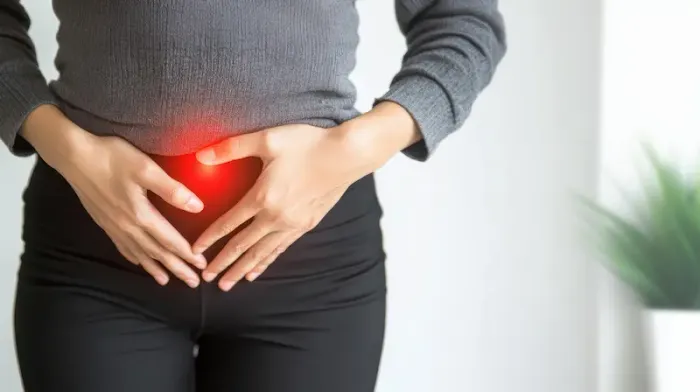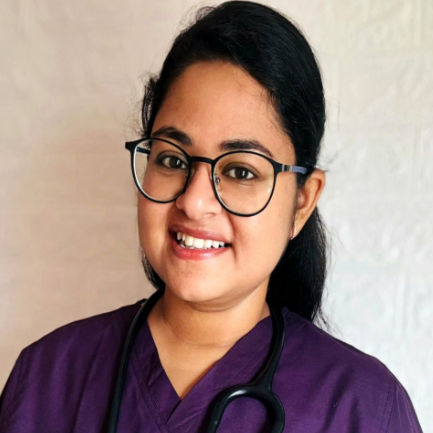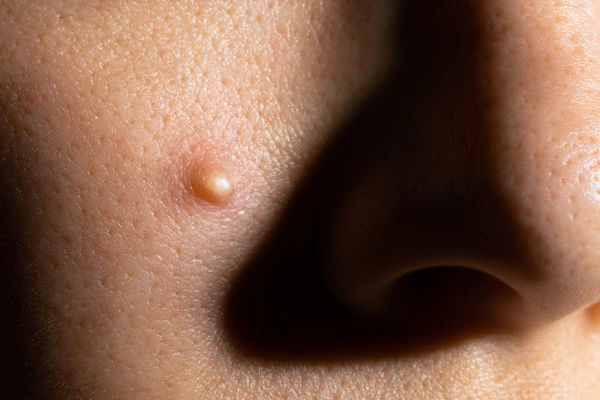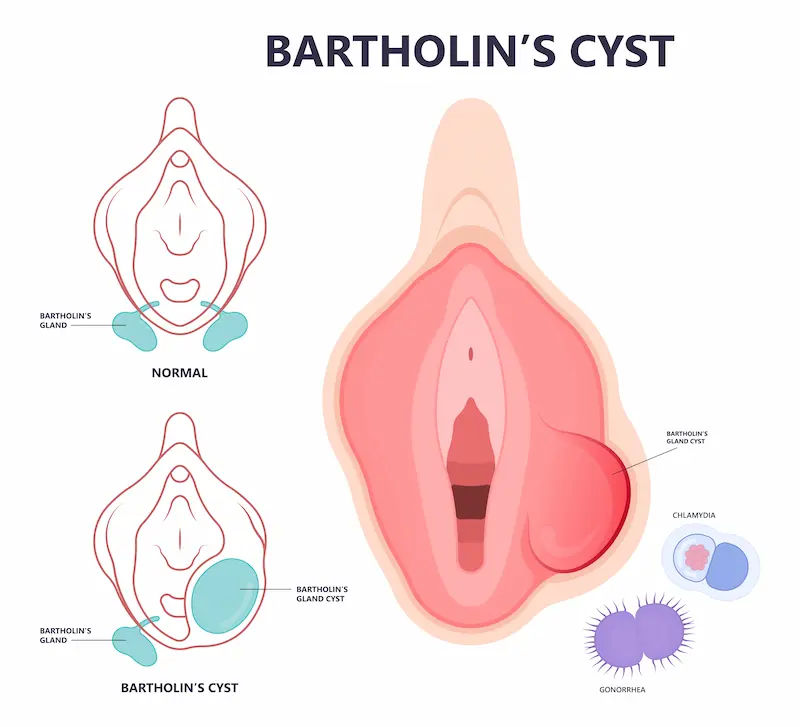Ovarian Cysts - Overview of Symptoms and Treatment
Know about the ovarian cysts, what they are, common symptoms, causes, diagnosis, treatment options and home remedies for ovarian cysts.

Written by Dr. Mohammed Kamran
Reviewed by Dr. Dhankecha Mayank Dineshbhai MBBS
Last updated on 13th Jan, 2026

Introduction
Ovarian cysts are fluid-filled sacs that develop on or inside the ovaries. While most ovarian cysts are harmless and go away on their own, some may cause discomfort or lead to complications. Understanding the symptoms, causes, and treatment options can help you manage this condition effectively.
What Are Ovarian Cysts?
Ovarian cysts are small, fluid-filled pockets that form on or within the ovaries. Many women develop them at some point in their lives, especially during their childbearing years. Most cysts are benign (non-cancerous) and resolve without treatment. However, in some cases, they may grow larger, cause pain, or require medical intervention.
Consult a Gynaecologist for Personalised Advice
Common Symptoms of Ovarian Cysts
Many women with ovarian cysts experience no symptoms at all. However, if a cyst grows large or ruptures, it may cause:
• Pelvic pain – A dull or sharp ache in the lower abdomen, often on one side.
• Bloating or swelling – A feeling of fullness or pressure in the abdomen.
• Irregular periods – Changes in menstrual cycles, including heavier or lighter bleeding.
• Pain during intercourse – Discomfort during or after sex.
• Frequent urination – Pressure on the bladder may make you feel the need to urinate more often.
• Nausea or vomiting – If a cyst causes twisting of the ovary (ovarian torsion).
If you experience sudden, severe pelvic pain, fever, dizziness, or rapid breathing, seek medical help immediately, as these could indicate a ruptured cyst or ovarian torsion, which requires urgent care.
Causes and Types of Ovarian Cysts
There are different types of ovarian cysts, each with different causes:
1. Functional Cysts – The most common type, these form during the menstrual cycle and usually disappear on their own.
• Follicular cysts – When a follicle (which holds an egg) doesn’t release the egg and swells with fluid.
• Corpus luteum cysts – Form after the egg is released and the follicle seals off, filling with fluid.
2. Dermoid Cysts – Contain tissues like hair, skin, or teeth (rare but can grow large).
3. Cystadenomas – Filled with watery or mucous-like fluid and can become quite large.
4. Endometriomas – Caused by endometriosis, where uterine-like tissue grows outside the
5. Polycystic Ovary Syndrome (PCOS) – A hormonal disorder leading to multiple small
cysts on the ovaries.
How Are Ovarian Cysts Diagnosed?
If you have symptoms, your doctor may recommend:
• Pelvic Ultrasound – To visualise the cyst’s size, shape, and location.
• Blood Tests – To check hormone levels or rule out ovarian cancer (CA-125 test).
• Laparoscopy – A minimally invasive procedure to examine and remove cysts if needed.
Health topic carousel:
Lab test: Pelvic ultrasound, CA-125 Test and laparoscopy.
Text: Get Your Health Assessed
Treatment Options for Ovarian Cysts
Most small, asymptomatic cysts don’t require treatment and go away on their own. However, if a cyst is large, painful, or suspicious, treatment options include:
1. Watchful Waiting – Monitoring the cyst with follow-up ultrasounds.
2. Pain Management – Over-the-counter pain relievers like ibuprofen can help with discomfort.
3. Hormonal Birth Control – Pills or hormonal therapy can prevent new cysts from forming.
4. Surgery – Recommended if the cyst is large, persistent, or potentially cancerous.
- Laparoscopy – A minimally invasive procedure to remove the cyst.
- Laparotomy – A more extensive surgery if the cyst is very large or cancerous.
Lifestyle and Home Remedies
While ovarian cysts can’t always be prevented, these steps may help reduce risk and manage symptoms:
• Maintain a Healthy Diet – Eat fibre-rich foods, fruits, vegetables, and lean proteins.
• Exercise Regularly – Helps regulate hormones and reduce stress.
• Stay Hydrated – Supports overall reproductive health.
• Manage Stress – Yoga, meditation, and deep breathing can help balance hormones.
• Monitor Symptoms – Keep track of menstrual cycles and any unusual pain.
When to See a Doctor?
Consult a doctor if you experience:
• Severe or sudden pelvic pain
• Fever with pelvic discomfort
• Dizziness or weakness
• Unexplained weight loss or bloating
Final Thoughts
Ovarian cysts are common and often harmless, but it’s important to recognise symptoms and seek medical advice when needed. With proper diagnosis and treatment, most women manage cysts effectively without complications. Stay informed, listen to your body, and don’t hesitate to reach out to a healthcare provider if you have concerns.
Consult a Gynaecologist for Personalised Advice
Consult a Gynaecologist for Personalised Advice

Dr. Sanjan Das
Obstetrician and Gynaecologist
15 Years • MBBS,MS
Bengaluru
Apollo Clinic, Sarjapur Road, Bengaluru

Dr. Mehnaz Rashid
Obstetrician and Gynaecologist
7 Years • MBBS, DNB (Obstetrics & Gynaecology), D.MAS, F.MAS, WALS
Bengaluru
Wellstar Polyclinic and Diagnostic Center, Bengaluru
(275+ Patients)

Dr. Sreeparna Roy
Obstetrician and Gynaecologist
8 Years • MBBS , MS (OBSTETRICS & GYNAECOLOGY), Fellowship in Infertility, Endoscopy & Ultrasonography), Fellowship in Laparoscopy & Hysteroscopy,DRM
Barasat
Diab-Eat-Ease, Barasat

Dr. Rituparna De
Obstetrician and Gynaecologist
7 Years • MBBS, MS (Obstetrics & Gynaecology)
Kolkata
MCR SUPER SPECIALITY POLY CLINIC & PATHOLOGY, Kolkata

Dr. Sreeparna Roy
Obstetrician and Gynaecologist
8 Years • MBBS , MS (OBSTETRICS & GYNAECOLOGY), Fellowship in Infertility, Endoscopy & Ultrasonography), Fellowship in Laparoscopy & Hysteroscopy,DRM
Kolkata
Dr Utsa Basu Clinic, Kolkata
Consult a Gynaecologist for Personalised Advice

Dr. Sanjan Das
Obstetrician and Gynaecologist
15 Years • MBBS,MS
Bengaluru
Apollo Clinic, Sarjapur Road, Bengaluru

Dr. Mehnaz Rashid
Obstetrician and Gynaecologist
7 Years • MBBS, DNB (Obstetrics & Gynaecology), D.MAS, F.MAS, WALS
Bengaluru
Wellstar Polyclinic and Diagnostic Center, Bengaluru
(275+ Patients)

Dr. Sreeparna Roy
Obstetrician and Gynaecologist
8 Years • MBBS , MS (OBSTETRICS & GYNAECOLOGY), Fellowship in Infertility, Endoscopy & Ultrasonography), Fellowship in Laparoscopy & Hysteroscopy,DRM
Barasat
Diab-Eat-Ease, Barasat

Dr. Rituparna De
Obstetrician and Gynaecologist
7 Years • MBBS, MS (Obstetrics & Gynaecology)
Kolkata
MCR SUPER SPECIALITY POLY CLINIC & PATHOLOGY, Kolkata

Dr. Sreeparna Roy
Obstetrician and Gynaecologist
8 Years • MBBS , MS (OBSTETRICS & GYNAECOLOGY), Fellowship in Infertility, Endoscopy & Ultrasonography), Fellowship in Laparoscopy & Hysteroscopy,DRM
Kolkata
Dr Utsa Basu Clinic, Kolkata

